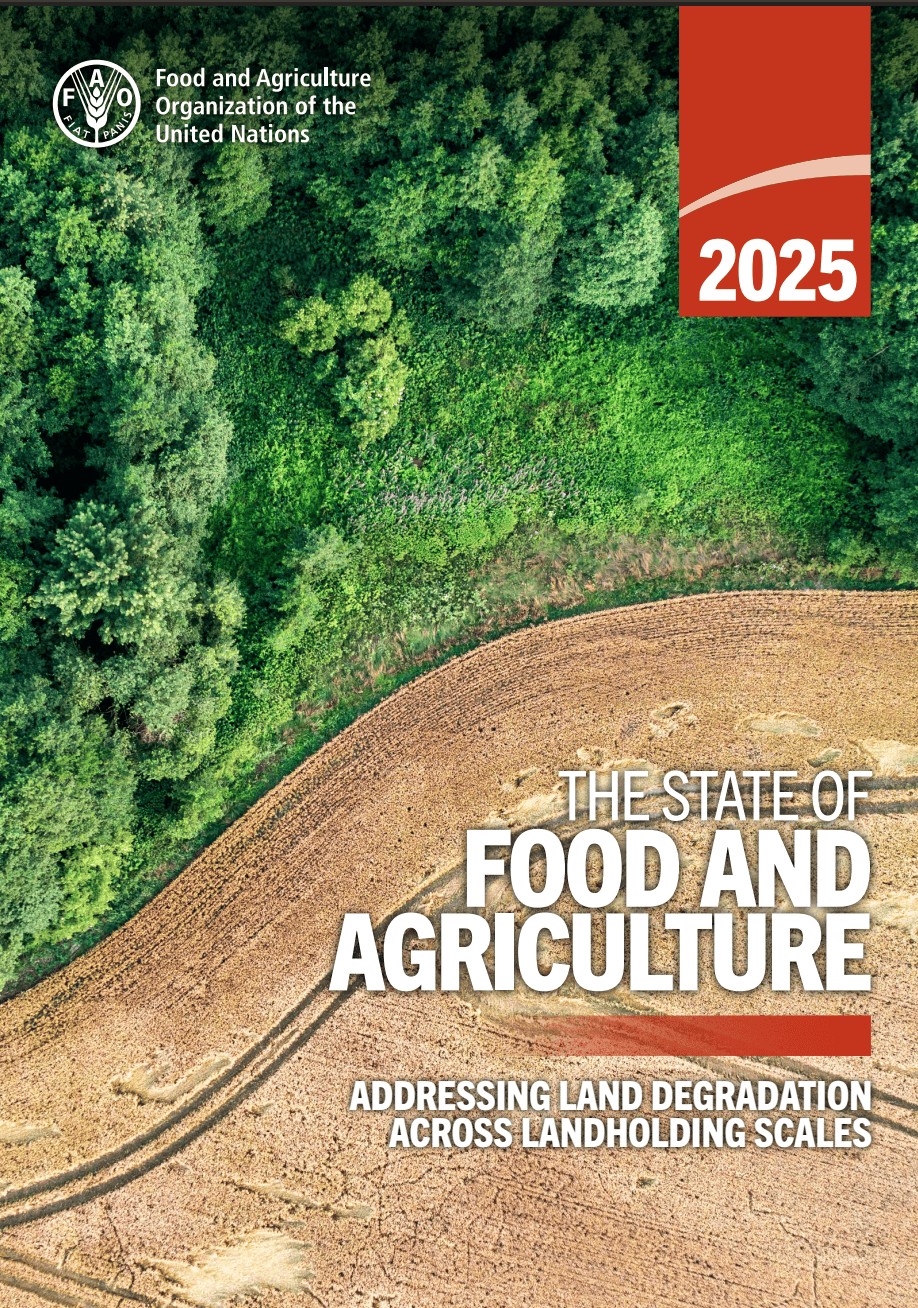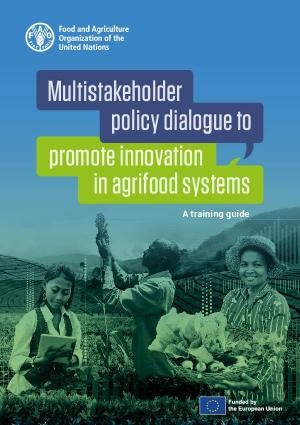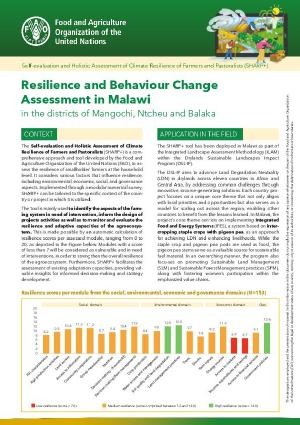публикации
На первом плане

Стратегия ФАО в области науки и инноваций
10/2022
Задача Стратегии – придать импульс работе ФАО в области науки и инноваций, обеспечив необходимое руководство, слаженность и согласованность общеорганизационной работы в области науки и инноваций. Наука и инновации являются ключевыми элементами Стратегической рамочной программы ФАО на 2022–2031 годы, они актуальны для всех секторов, на которые распространяется программа работы Организации.

План действий на 2026–2029 годы по осуществлению Стратегии ФАО в области науки и инноваций
01/2026
План действий на 2026–2029 годы по осуществлению Стратегии ФАО в области науки и инноваций определяет порядок ее реализации. В нем приводится единая концепция действий Организации на страновом, субрегиональном, региональном и глобальном уровнях
-
Highlights of science and innovation in FAO’s work
фев 9, 2026, 11:24 -
План действий на 2026–2029 годы по осуществлению Стратегии ФАО в области науки и инноваций
янв 7, 2026, 15:51 -
Agrifood Systems Technologies and Innovations Outlook (ATIO)
дек 10, 2025, 10:58 -
The State of Food and Agriculture 2025
ноя 5, 2025, 13:39 -
The Status of Youth in Agrifood Systems
июл 9, 2025, 07:14 -
Science and Innovation Forum 2024: A Roadmap to Transformation
июн 10, 2025, 14:07 -
Guidance on integrated pest management for the world’s major crop pests and diseases
май 26, 2025, 07:41 -
Global Report on Food Crises 2025
май 19, 2025, 10:29 -
Investing in trade digitalization: the case of ePhyto
мар 24, 2025, 16:03 -
Multistakeholder policy dialogue to promote innovation in agrifood systems
фев 27, 2025, 11:13 -
SHARP+ resilience assessment in the United Republic of Tanzania in the districts of Kaliua, Mlele, Sikonge and Urambo
фев 27, 2025, 10:53 -
SHARP+ resilience assessment in Somalia in the districts of Jowhar and Balcad
фев 27, 2025, 10:39 -
Resilience and behaviour change assessment in Malawi in the districts of Mangochi, Ntcheu and Balaka
фев 27, 2025, 10:27 -
Self-evaluation and Holistic Assessment of Climate Resilience of Farmers and Pastoralist (Sharp+)
фев 21, 2025, 10:36 -
Agro-industry versus agroecology? Two macroeconomic scenarios for 2050 in Andhra Pradesh, India
фев 21, 2025, 10:27 -
Guide for strengthening functional capacities in agricultural innovation
фев 21, 2025, 10:18 -
Curriculum for training of Multi-actors Agricultural Innovation Platform facilitators
фев 21, 2025, 10:01 -
Leveraging space technology for agricultural development and food security
фев 17, 2025, 10:23 -
Agrifood Systems Technologies and Innovations Outlook: Concept Note
янв 5, 2025, 16:03 -
Case studies of agrifood systems technologies and innovations for climate action at country level
дек 30, 2024, 10:19

План действий на 2026–2029 годы по осуществлению Стратегии ФАО в области науки и инноваций
01/2026
План действий на 2026–2029 годы по осуществлению Стратегии ФАО в области науки и инноваций определяет порядок ее реализации. В нем приводится единая концепция действий Организации на страновом, субрегиональном, региональном и глобальном уровнях

Highlights of science and innovation in FAO’s work
01/2026
The Highlights of science and innovation in FAO’s Work report was developed to illustrate the breadth and depth of science and innovation in FAO’s efforts. The FAO Science and Innovation Strategy is a key tool to support the implementation of the FAO Strategic Framework 2022-31. The report presents examples of FAO's work that reflect the Strategy’s broad scope, inclusive of all scientific disciplines and all types of innovation.
--use-case-analysis.jpg?sfvrsn=4a253a2c_11)
Agrifood Systems Technologies and Innovations Outlook (ATIO) Use cases analysis for the ATIO Knowledge Base: personas, content needs and search journeys
12/2025
The ATIO Knowledge Base (KB) was co-designed through a participatory consultation process to ensure it meets the diverse needs of its users. The use cases identified span a wide range of stakeholders, including researchers, policymakers, farmers, NGOs, youth, investors, and private sector actors, each with distinct information needs and search behaviors.

The State of Food and Agriculture 2025- Addressing land degradation across landholding scales
11/2025
The 2025 edition of The State of Food and Agriculture explores the theme “Addressing land degradation across landholding scales”. It examines the implications of human-induced land degradation for agricultural production, producers of all scales and vulnerable populations.

The Status of Youth in Agrifood Systems
07/2025
Young people stand at the heart of a rapidly changing world. They have the vision, energy and entrepreneurial spirit to find new and innovative ways to cultivate, create, package and transport the food we all need. If adequately nourished, educated, equipped with resources and involved in decision-making, young people can drive economic transformation and global prosperity.

Guidance on strengthening national science–policy interfaces for agrifood systems
06/2025
In line with its Science and Innovation Strategy, FAO has developed this guidance on strengthening science–policy interfaces (SPIs) for agrifood systems at the national level, helping to ensure that effective policy decisions are made based upon sufficient, relevant, and credible science and evidence.

Science and Innovation Forum 2024: A Roadmap to Transformation
06/2025
The Science and Innovation Forum (SIF) 2024 Report captures the key outcomes and insights from one of the cornerstone events of the World Food Forum (WFF), held from 14–18 October 2024. Under the theme “Inclusive Science and Innovation for Agrifood Systems Transformation, Leaving No One Behind,” the report explores how inclusive, equitable, and accessible science and innovation can drive sustainable change in global agrifood systems.

Guidance on integrated pest management for the world’s major crop pests and diseases
05/2025
In this volume, FAO has compiled integrated pest management (IPM) measures for eight global priority pests and pathogens, based upon geographical distribution, severity and societal importance. Each chapter offers a ‘bundle’ of IPM solutions for the principal pest threats of cereal grains, potato, fruits and vegetables.

Global Report on Food Crises 2025
05/2025
This Global Report on Food Crises is another unflinching indictment of a world dangerously off course. Hunger is not an emergency confined to certain pockets of the world or periods of time. It is fast becoming a scar etched into the lives of millions around the globe. Fueled by conflict, geopolitical tensions, climate chaos, environmental vulnerabilities, and economic upheaval, food and nutrition crises define the lives of millions– not for weeks or months, but for years and even lifetimes.

Investing in trade digitalization: the case of ePhyto
03/2025
Global trade in plants and plant products is rapidly expanding – more than doubling in some cases – and set to grow another 11 percent by 2032. Yet, many countries still employ mostly manual rather than electronic means for issuing the phytosanitary certificates required to trade goods internationally. Relying on paper slows applications for and delivery of these certificates.

Multistakeholder policy dialogue to promote innovation in agrifood systems
02/2025
Many agrifood development projects and programmes aim to support evidence-based and inclusive policies by organizing policy dialogues. Yet, despite their widely recognized importance, there is little guidance available to date on how to organize effective policy dialogues that are inclusive of diverse stakeholders. This training guide has been developed to address this gap by providing clear and comprehensive guidance on multistakeholder policy dialogue in agrifood systems.

Leveraging space technology for agricultural development and food security
02/2025
This report underscores the transformative potential of space technologies in enhancing agricultural productivity and ensuring food security amid global challenges.

Resilience and behaviour change assessment in Malawi in the districts of Mangochi, Ntcheu and Balaka
01/2025
This factsheet presents key findings from surveys conducted in Mangochi, Ntcheu, and Balaka between November and December 2023, using the Self-evaluation and Holistic Assessment of Climate Resilience of Farmers and Pastoralists (SHARP+) methodology—a tool developed by the Food and Agriculture Organization (FAO) to assess the resilience of smallholder farmers at the household level.

Curriculum for training of Multi-actors Agricultural Innovation Platform facilitators
01/2025
Multi-actors Agricultural Innovation Platform (MAIP) is established in rural communities where farmers and key value chain actors become empowered through participatory action research, knowledge co-creation and application, market linkages and so on.

Self-evaluation and Holistic Assessment of Climate Resilience of Farmers and Pastoralist (Sharp+)
01/2025
The SHARP+ In-Brief presents the mains uses and implementation of the tool

Agrifood Systems Technologies and Innovations Outlook: Concept Note
12/2024
The Agrifood Systems Technologies and Innovations Outlook (ATIO) initiative, launching in 2025, aims to enhance understanding of technology and innovation uptake and factors shaping the technology frontier in agrifood systems. It will be the most comprehensive global source of information on innovative solutions for Agrifood Systems Transformation.

Case studies of agrifood systems technologies and innovations for climate action at country level
12/2024
Climate change is having a devastating effect on many of the world’s agrifood systems and the communities that rely on them for their livelihoods. This compendium contains summaries of forty case studies, from a total of over two hundred submitted to FAO for the Science and Innovation Forum 2023, that describe innovative efforts that have been made to address some of the challenges arising from climate change.

SHARP+ resilience assessment in Somalia in the districts of Jowhar and Balcad
12/2024
The SHARP+ resilience assessment in Somalia factsheet presents key findings from surveys conducted in the districts of Jowhar and Balcad in September 2024, as part of the multi-actor programme Jowhar Off-stream Storage Programme (JOSP).

Agro-industry versus agroecology? Two macroeconomic scenarios for 2050 in Andhra Pradesh, India
12/2024
This book presents the first macroeconomic scenario of a full transition to agroecology in 2050. It is for Andhra Pradesh, a state in southern India with 53 million inhabitants and 9.3 million farmers in 2020.

Climate technologies for agrifood systems transformation Placing food security, climate change and poverty reduction at the forefront
12/2024
The report highlights the needs for robust technology assessments to underpin climate technology identification for agrifood systems transformation that addresses all stages of agrifood value chains. This needs to be supported by capacity-building programmes, targeted financing and fed into the ongoing climate policy process.
